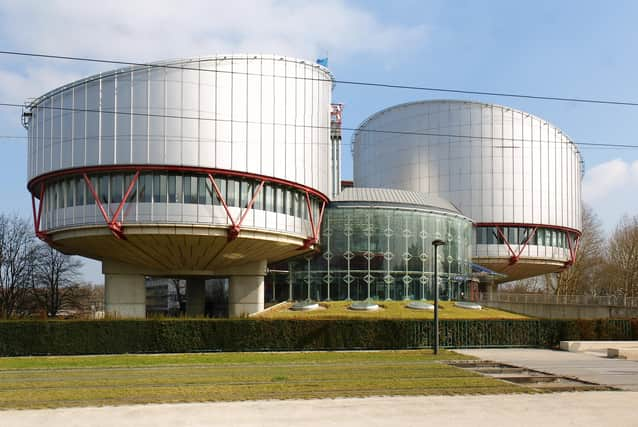The UK’s highest court hands yet another propaganda victory to Irish republicans


With its ruling on the ‘hooded men’ (December 15, see links below)case the Supreme Court has further undermined public confidence in our criminal justice system.
The court determined that the PSNI was wrong in deciding not to reinvestigate allegations against the security services of torturing 14 internees in 1971.
Advertisement
Hide AdAdvertisement
Hide AdThis is despite the fact that the European Court of Human Rights ruled in 1978 that the five techniques constituted a form of ill-treatment, rather than ‘torture’ as defined in Article 3 of the European Convention on Human Rights.


The court subsequently confirmed this judgment in 2018 in response to an attempt by the Irish government to have its 1978 decision reversed.
This continuing lawfare around events which took place 50 years ago in another world is wholly disproportionate in terms of court time, legal costs and possible benefits.
It rewards republican propagandists, activist lawyers and the thriving human rights industry at the expense of the rest of us.
Advertisement
Hide AdAdvertisement
Hide AdOfficial documents in the National Archives of Ireland show that Dublin has played the internees’ case since 1971 as a means to pressurise London to advance its own political agenda.
It continues to do so despite its 1998 international treaty obligations to promote positive east/west relations and reconciliation in Northern Ireland.
Whatever their propriety and legality, the Ministry of Defence concluded that, with Northern Ireland on the brink of civil war, the use of the five techniques had by December 1971 helped the security services to gather useful information on IRA arms dumps, membership, structure and operating procedures.
It was weakening IRA morale and resilience.
So naturally the republican movement campaigned hard to end it.
Advertisement
Hide AdAdvertisement
Hide AdThey found a receptive audience in the Irish government and their friends in the Foreign and Commonwealth Office.
It is clear from official records in London and Dublin that both were concerned that if the IRA were defeated too quickly, this would thwart their common long-term objective of promoting a united Ireland.
If unionists saw that the IRA was being defeated, they would not yield ground on powersharing.
The British government announced in March 1972 that it would no longer use the techniques on prisoners, although they are apparently still used in training SAS recruits to resist them.
The so-called ‘Rees memo’ is irrelevant.
Advertisement
Hide AdAdvertisement
Hide AdRees was a politician, criticising decisions taken by his Conservative predecessors. His opinion is of no legal consequence.
The matter was settled by the European Court in 1978 and reaffirmed by the same court in 2018. There is no legitimate justification for further investigation by the PSNI or anyone else.
Dr WB Smith, Belfast BT15 (Author of ‘The British State and the Northern Ireland Crisis’ and co-editor of ‘The Idea of the Union’)
• More on ‘The Idea of the Union’ below:
Advertisement
Hide AdAdvertisement
Hide Ad• Joe Lynam: Book author is out of date about Irish voices in Britain, because we laud our contented lives in UK
• Extract from ‘The Idea of the Union’ Dec 11: Lawfare against the UK state by nationalists cannot lose
• Extract Dec 8: There is silence among the Irish about their relocation to Britain
• Extract Dec 4: London is a cultural capital for the Irish
Advertisement
Hide AdAdvertisement
Hide Ad• Extract from David Trimble, Nov 27: I feel betrayed by the Northern Ireland Protocol, which rips out the heart of the 1998 Belfast Agreement
• Book Review of ‘The Idea of the Union’ Nov 20: Unionist leaders should read this vital defence of NI’s place in UK
• Authors of ‘The Idea of the Union’ Oct 30: We probe Irish nationalist myths in our new book which defends the Union
——— ———
A message from the Editor:
Thank you for reading this story on our website. While I have your attention, I also have an important request to make of you.
Advertisement
Hide AdAdvertisement
Hide AdWith the coronavirus lockdowns having had a major impact on many of our advertisers — and consequently the revenue we receive — we are more reliant than ever on you taking out a digital subscription.
Subscribe to newsletter.co.uk and enjoy unlimited access to the best Northern Ireland and UK news and information online and on our app. With a digital subscription, you can read more than 5 articles, see fewer ads, enjoy faster load times, and get access to exclusive newsletters and content.
Visit
now to sign up.
Our journalism costs money and we rely on advertising, print and digital revenues to help to support them. By supporting us, we are able to support you in providing trusted, fact-checked content for this website.
Ben Lowry, Editor